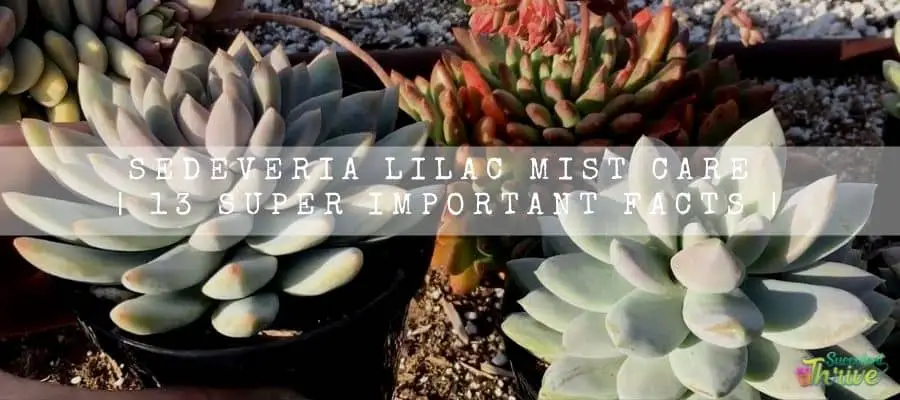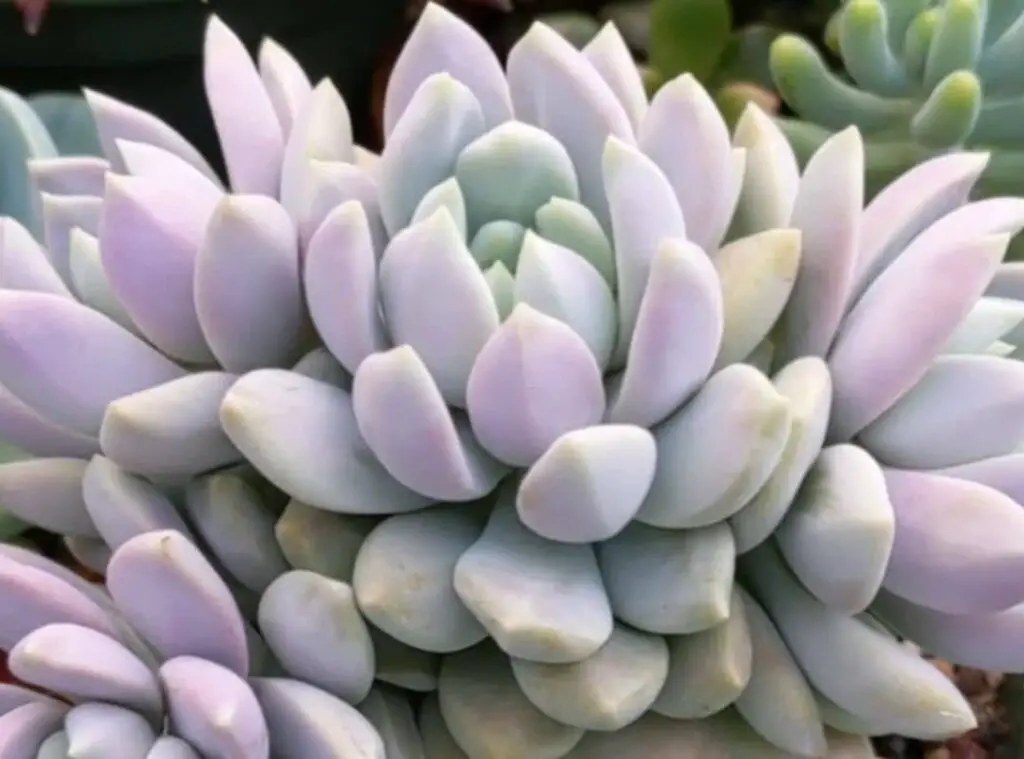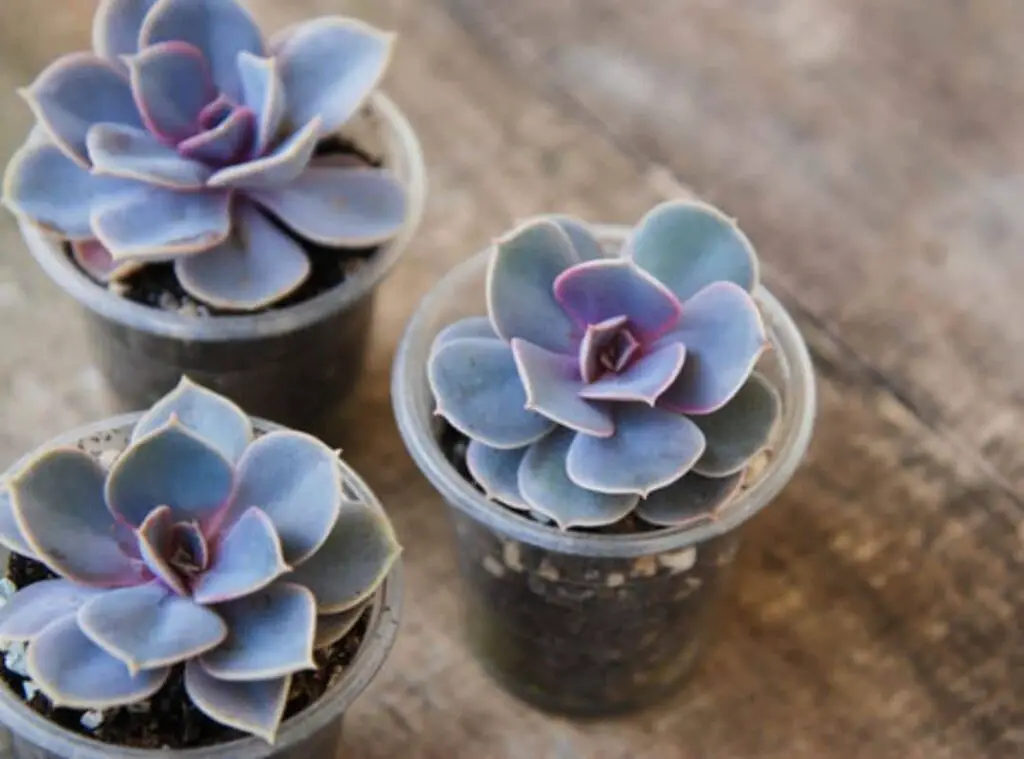You could spot Sedeveria lilac mist growing with light green colored leaves, particularly the leaves which are closer to the stem.
Sedeveria lilac mist inherits their names from their unique color. Lets find more about this beautiful succulent in this article.

What is sedeveria lilac mist?
Sedeveria lilac mist is a hybrid of sedum and echeveria.
If I elaborate further on this, Sedum is a diverse and perennial plant which usually thrive in hot and dry weather conditions. On the other hand, Echeveria forms a wide array of color and shape.
When you cross these two, you could end up having new sets of plants which have attractive textures, interesting colors, unique leaves formations and finally with a wide array of growth habits.
Sedeveria lilac mist plants belong to the family Crassulaceae. These plants would tend to take a rosette shape along with chubby leaves. Once they grow, they take a chunky shape.
They would perfectly fit in for containers with several other succulents. In addition to that you could grow them in individual pots as solitary plants too.
You could grow them in rock gardens or desert style beds when growing outdoors.
How do I identify a sedeveria lilac mist?
Sedeveria lilac mist plants could be usually spotted with leaves in light green color, particularly the leaves which are closer to the stem.
Further, Sedeveria lilac mist usually has a powdery farina which gives a silvery blue look for the plant and you could identify these plants from that characteristic as well.
Moreover, if you expose them for bright sunlight, it will create highlights in orange and rose colors in the plant.
These plant leaves would grow in a slightly upward manner. As they grow and reach their mature size, their stems would also elongated.
In addition to that you could identify these plants by looking at their flowers as well. They usually produce bright colored flowers during spring.
Size
Sedeveria lilac mist plants could be about 30 cm in width and 20 cm in height. They usually tend to grow in clumps
Growth
Sedeveria lilac mist are slow growing plants.
One look care guide
| Botanical Name | Sedeveria lilac mist |
| Common Name | TBN |
| Plant Type | Succulent |
| Mature Size | 30 cm in width and 20 cm in height |
| Sun Exposure | Full sunlight to partial sunlight |
| Soil Type | Well-draining |
| Soil pH | 5.0-7.0 – Acidic to neutral |
| Bloom Time | Spring |
| Flower Color | Bright colored |
| Hardiness Zones | 9a-11b USDA zones |
| Native Area | TBN |
| Toxicity | Nontoxic |
| Average price | 10 USD |
13 ways to take care of a sedeveria lilac mist
Light Requirement
Sedeveria lilac mist plants would thrive well in full sunlight to partial sunlight.
If you consider growing these plants as indoor plants, you may place them near a bright sunny window.
Alternatively, you could consider growing them near a grow light as well.

Temperature and humidity
Sedeveria ’Lilac Mist ‘would prefer to grow in 9a-11b USDA zones. The ideal temperatures for them to grow would be 6.7degress Celsius (20 degrees Fahrenheit).
As such if you live in a colder area, you may grow them as indoor plants. Best is to locate them near a bright sunny window.
Sedeveria lilac mist plants will not withstand hard frost conditions. As such you need to protect your beloved plants from frost conditions.
Apart from that they would perform well with ample airflow as well.
Is it cold hardy?
Sedeveria lilac mist plants does not handle cold well
USDA hardiness zone
Sedeveria lilac mist plants preferred USDA zones would be 9a-11b -6.7 °C (20 F)
Watering Requirement
When it comes to watering them, their watering requirement is quite similar to the rest of other succulents.
Literally you should not supply them excess water since they are prone for root rot. Best is to apply the soak and dry method when watering sedeveria ’Lilac Mist’ plants.
This would be ever effective particularly when you are growing them as indoor plants.
As such, you simply have to first give them a good soak of water and then let the excess water move through the draining holes of the pot.
They are not dependent on too much water. Consider that you have grown them outdoors, then they could survive with only the natural rain there.
Having said that, if the plant is going through hot and dry weather conditions, you could consider watering them.
In other words, if you could spot any shriveled appearance of the Sedeveria lilac mist plant, you should lightly water them.
In addition to that, ideally you need to use a spray bottle of water when watering these plants. That will avoid any potential water collection between the leaves and the rosettes.
That will allow you to avoid any overhead watering and consequently it will secure the plant from fungal infections.
Soil Requirement Type / pH
Sedeveria lilac mist plants would perform well in soil mix which have a ph. of 5.0.-7.0. In other words, it has to be an acidic, neutral soil mix.
Moreover, your soil mix should be a porous soil mix which is well draining. It is important that you grow them in the right soil mix so that it would help them to grow well.
Right soil mix needs to be loose. As such you may consider adding coarse grit. Alternatively, you could just start with grit and add compost too.
Flowering and Fragrance
Sedeveria lilac mist plants flowers would be bright colored. They would usually bloom in spring. It is a treat to watch them when they are in their full blossom.

Pot size Potting and Repotting
I would recommend growing Sedeveria lilac mist plants in terracotta pots since they are porous material, and they would dry out faster too.
When it comes to repotting, they do not require repotting on a frequent basis. However, you should consider repotting them, when you freshly purchase them from the stores.
Where to Plant
Sedeveria lilac mist plants would thrive well in places where they get exposed for strong sunlight.
As such if you wish to grow them outdoors, you need to select a place where they can gain enough sunlight.
Ideally it has to be a place where the plants get full sunlight to partial sunlight. However, they would perform well outdoors rather than indoors.
In addition to that, these plants would thrive well in warm climates as well. They would thrive well in zone 9a-11b.
Average temperature in those zones would be around 6.7 degrees Celsius (20 degrees Fahrenheit).
On the other hand, if you live in a cooler area, I encourage you to grow them as indoor plants.
What is more important is to provide them adequate sunlight as that would greatly help the Sedeveria lilac mist plants to flourish.
Fertilizer and time of year
This plant does not need frequent feeding. You can add fertilizer during their active growing seasons. They do not require fertilizers during their dormant period.
Dormancy
Sedeveria lilac mist plants are summer dormant plants.
Can be toxic to pets
These plants are not toxic for pets.
Common bugs and illnesses
Root rot would be a major problem which you will come across when growing these plants. As such, you need to make sure that you do not over water these plants.
Instead, water them moderately and ensure that excess water is moving through the draining holes. Root rot could be so dangerous since chances are that you may also even lose the plants.
In addition to that, mealybugs and scales are a couple of bugs which you may encounter when growing the Sedeveria lilac mist plants.
They usually depend on the plant’s sap. They could also make fatal impacts on these plants.
Therefore, it is important that you keep checking these plants on a weekly basis and see whether there are any early signs of pest’s attacks or any diseases.
If you identify any pests, you may treat them with an insecticide. Moreover, make sure that you provide the right growing conditions for them. That will avoid any potential attack or any disease.
Special Care tips
If you spot any shriveled leaves, best is to remove those.
So that it will avoid any potential fungal infection. Further ensure that you water them moderately too.
Sedeveria lilac mist plant benefits
They would be handy as great house plants. In addition to that, you could consider growing them in containers and place them on the porch or on the patio.
Further you may use them in rock gardens or in succulent gardens.
Related questions
How often should I water my Sedeveria?
You need to water your Sedeveria lilac mist plants when their soil is dry. You need to water them less during summer since that would be their dormancy season.
How do you care for a Sedeveria hybrid?
Watering them appropriately is very crucial when taking care of these plants. If you are growing them indoors, you could practice the soak and dry method.
Further provide them with full sunlight to partial sunlight as that would also help them to grow well. Further ensure that you are providing a well-draining soil mix for them to perform well.
Conclusion
To wind up, trust this article was useful for you to enhance your knowledge on the Sedeveria lilac mist plants and hope you are now aware of how to take care of them properly.
Read Next : Aeonium Kiwi Dying | 6 Common Problems Everybody Face |
Read Next : Graptoveria Blue Pearl Ultimate Care Guide With 3 Propagation Methods
Read Next : Graptosedum Alpenglow Ultimate Care And 4 Propagation Methods
